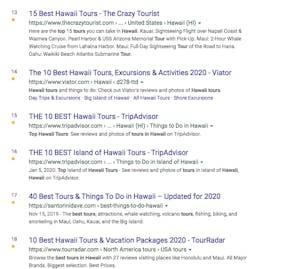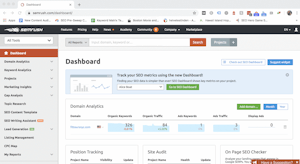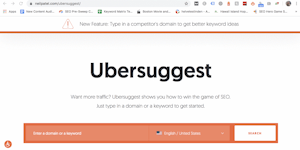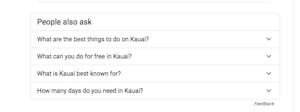- 8 minute read
- Reputation Management
- SEO
Beginner,
Intermediate
Join hundreds of other operators and REGISTER NOW for Spark 2024 New Orleans October 13-15th!

You’ve probably seen us mention keywords quite often throughout our guides — as they’re an integral part of SEO, PPC, and more — but you might be wondering where these mythical words and phrases come from. This guide will cover what keyword research is, why it’s important for your SEO, some common misconceptions, and how to find the right keywords for your business using a couple of different tools.
Keyword research is a core part of search engine optimization, although it has greatly evolved over the years. Moz.com defines it best: “Keyword research is the process of identifying popular phrases or words that people search in search engines in an attempt to optimize for those phrases.” What this means for your business is finding the keywords that travelers are searching in relation to what you have to offer, allowing you to use those phrases on your website and beyond to drive qualified traffic to your business.
As a business owner and marketer, keyword research helps you understand what people are searching for, how high the competition is for the keywords you want to target, and what your chances are of ranking for certain keywords. This understanding helps you optimize your website, marketing efforts, and more, giving you a better chance of appearing in organic search results and bringing the right people to your website — people looking to book the types of tours and activities you offer.
Back in the early days of SEO, keyword stuffing was an effective tactic, basically stuffing the main keyword and its variations into your title tag, meta description, and the content of your page as frequently as possible to rank better in the search engine results page of Google. This technique is now outdated, and Google has become very familiar with it. The search engine has evolved to focus on the relevance of keywords over the number of times they appear on a page, valuing quality over quantity.
We recommend writing for humans and not search engines, sprinkling keywords and their combinations naturally throughout your site when they’re relevant. Google can and will penalize you for any suspected keyword stuffing, so just avoid it altogether.
It’s not enough to just find a general keyword that relates to your business and add it to your website. It is important to target the actual intent of the keyword to give searchers the exact information they’re looking for when typing their query, which in turn tells the search engine that your page is relevant to this keyword.
The best way to find the intent behind a keyword is to Google the keyword you want to optimize on your site to see what kind of search results show up, i.e. homepages, long-form content like blog posts and articles, or category pages. For example, say your business wants to target the phrase “the best tours in Hawaii” on the homepage, and you want to figure out whether that’s a good fit. Let’s Google this phrase — what do we see?

We mostly see articles and blog posts featuring the top tours in Hawaii for 2020, and they’re all formatted as numbered lists. That means that people typing this query want to know more information about the types of tours available and aren’t quite ready to settle on one tour or one tour company to book with just yet. Google knows this, and so they display mostly long-form articles and blog posts.
Now you know that even if you add the keyword “the best tours in Hawaii” to your homepage, it’s not likely to appear in the search results because a homepage doesn’t satisfy the search intent. To optimize for this keyword on your website, it would make more sense to write a blog post with a list of some of the best tours on the island, giving you a better chance to rank and giving the reader plenty of options to consider while also exposing them to your brand and what your company has to offer.
There is a wide variety of tools and tactics you can use to perform keyword research, and the method can vary for each one. Here we offer some examples of popular tools you can use along with the steps to find the best keywords for your business.
SEMrush is a leading SEO tool, offering both a free version and a paid version. You can use it to find the keywords you’re already ranking for as well as what your competitors are ranking for to help you improve your SEO.

To perform keyword research with SEMrush:
 Pro tip: Rather than going straight for the highest volume keywords (which will also have the highest competition), start with the keywords where you already rank in the second or third page of the SERP and optimize those pages to rank higher. Also, remember that it takes time to rank, especially for new websites or pages, so be patient and don’t get discouraged!
Pro tip: Rather than going straight for the highest volume keywords (which will also have the highest competition), start with the keywords where you already rank in the second or third page of the SERP and optimize those pages to rank higher. Also, remember that it takes time to rank, especially for new websites or pages, so be patient and don’t get discouraged!
See SEMrush in action below!

Ubersuggest is a free tool from SEO expert Neil Patel. It’s similar to SEMrush in that you can enter in a domain or keyword to get different information or metrics. However, It does not offer all of the comprehensive tools that SEMrush offers, like link building tools, technical site audits, and more. Ubersuggest is still a great tool to help you analyze what pages are ranking for a certain keyword that you want to target.
To analyze a keyword using Ubersuggest:
See how to navigate Ubersuggest below.

Google’s “Related searches” section of the SERP is a favorite among the SEO community. It can give you different combinations of the types of searches people are performing, giving you keyword variation ideas that you can use in your SEO efforts. The great thing about using Google’s features for keyword research is that you don’t have to pay for any services or use any third-party sites to find useful keywords.
To perform keyword research using this tactic:

Let’s take a look at an example. If you search “snorkel tours in Maui” in Google and scroll to the bottom of the page, you can see this list of related keywords.

These are all great keywords that you may also want to target. Do you offer tours for beginners? Consider targeting “Maui snorkeling tours for beginners” Do you offer a Molokini snorkel tour? Add that keyword to the appropriate pages. Are your snorkel tours located in Kaanapali? Do you offer snorkeling deals? Use the ideas from “Related searches” to help you identify more specific keywords that searchers are using to find the types of tours and activities you offer.
Google’s “People also ask” feature is another crowd favorite. This section, which usually appears under the first few sites in the SERP, gives you ideas on what types of questions searchers are asking in relation to the specific keyword or query you’re researching.
To use this feature as part of your keyword research:

Let’s see this tactic in action. If you search “things to do in Kauai,” for example, these are the related queries you can see in the “People also ask” section.

The first result, “What are the best things to do on Kauai” would be a great blog post topic. Writing an article for your website structured around this query can help boost your traffic and direct searchers to your tours and activities. By doing a bit of competitor research, you can see how others have formatted similar articles, giving you an idea of what readers are searching for. Just be sure to add even more relevant and valuable information to your blog post to give you a leg up.
The phrase “What is Kauai best known for” is another great opportunity for a blog post, as is “how many days do you need in Kauai.” For both of these keywords, you could create a blog post answering the query and list a few of your different tours or activities as options!
Keyword research is invaluable to your SEO strategy, but that doesn’t mean it has to be complicated. As you can see, you already have a variety of tools for keyword research at your disposal right in the Google SERP! With these useful and intuitive tools, you can find the right keywords for your business and optimize your pages for relevance and keyword intent. Now that you know where to find them, head over to our guide on how to use keywords to improve your site’s ranking.